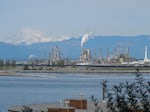
Tesoro's refinery in Anacortes, Washington.
John Ryan / KUOW
Gov. Jay Inslee’s attempt to lower the Washington’s greenhouse gas emissions has suffered a setback: A judge's ruling that the state can't implement parts of his signature Clean Air Rule.
The ruling, issued last Friday, strikes down the Washington Department of Ecology’s plans to curb greenhouse gases from imported petroleum and natural gas products. Thurston County Superior Court Judge James Dixon said the state needs the Legislature to pass a law okaying that part of the rule.
The state had argued that because the imported fuels would be burned in Washington — they emit greenhouse gases here — Washington has authority to regulate the practice. Those types of emissions make up about two-thirds of the greenhouse gas emissions in Washington, said Ecology spokeswoman Camille St. Onge.
“Petroleum products and natural gas are significant sources of emissions in our state. We believe the companies that profit from these products should contribute their fair share toward reducing the emissions,” St. Onge said.
Judge Dixon is expected to review written arguments from Ecology about whether the department can move forward with other parts of the rule. St. Onge said Ecology should still be able to enforce emissions reductions for other industries that do not import their products. That includes pulp and paper mills, cement kilns or aluminum smelters.
Washington's Clean Air Rule would have initially applied to businesses that produced 100,000 metric tons of carbon a year. They would have had to reduce their emissions by 1.7 percent each year. Overtime the rule would have expanded to other businesses.
Business groups that opposed the Clean Air Rule said they were pleased with the judge’s decision. Kris Johnson, Association of Washington Business, said although the group is committed to reducing greenhouse gases, this rule was not “the right way to accomplish the goal.”
“It was unnecessary and, if the rule was allowed to stand, would have made it more expensive to heat homes, drive to work and grow a business in the state of Washington because it would have put Washington manufacturers at a competitive disadvantage to national and international companies,” Johnson said in a news release.
Environmental groups that backed the plan in court said this should be a call to move forward with more laws to reduce emissions.
“We don’t want our policies in the state to be beholden to this kind of long drawn out legal process that’s not set in stone,” said Nick Abraham, with the Washington Environmental Council.
Vlad Gutman-Britten, Climate Solutions’ Washington director, said the group plans to “continue engaging on this process, and ultimately it will be settled on appeal.”
Inslee spokesperson Jaime Smith said the ruling will not affect his plan to push carbon-pricing legislation next year.
